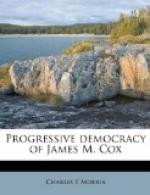“’It will of course be understood that in carrying out the purpose of the League, the government of the United States must at all times act in strict harmony with the terms and intent of the United States Constitution, which cannot in any way be altered by the treaty-making power.’
“Some people doubt the enduring quality of this general international scheme. Whether this be true or not, the fact remains that it will justify itself if it does no more than prevent the nations of the earth from arming themselves to the teeth and wasting resource which is necessary to repair the losses of the war. No one contends that it is a perfect document, but it is a step in the right direction. It would put the loose ends of civilization together now and do more toward the restoration of normal conditions in six months’ time than can the powers of the earth, acting independently, in ten years’ time. The Republican senatorial cabal insists that the treaty be Americanized. Suppose that Italy asked that it be Italianized— France that it be Frenchized—Britain that it be Britainized, and so on down the line. The whole thing would result in a perfect travesty.
“The important thing now is to enable the world to go to work, but the beginning must not be on the soft sands of an unsound plan. If this question passes to the next administration, there should be no fetich developed over past differences. Yet at the same time there must be no surrender of vital principles. It may be necessary if partitions and reparation require changing, to assemble representatives of the people making up the nations of the League, in which event revision may not be so much an affair of diplomats. But I repeat the pressing task is getting started, being careful however that we are starting with an instrument worth while, and not a mere shadow.”
To an extent to which very few public men favoring the League of Nations have gone, Governor Cox has expressed the firm conviction that the League will enable the people of Ireland to bring their contention and claims before a world tribunal. It was his statement before an audience in Cincinnati that the League would be the means by which the Irish case could be heard in the highest court in the world, and he stated that thus far it had never been heard even in a magistrate’s court. Sentiments on the question of self-determination were also expressed in his article in the New York Times. In this the Governor said:
“We are a composite people in the United States and the belief of students of government in years past that our democracy would not endure was based entirely upon the idea that we could not build a nation from the blood of many races which had old inherited prejudices. It is very important, particularly at this time when racial impulses and emotions have been stirred world-wide as never before, that we make the utmost effort to prevent division along these lines. In this connection it is well to bear in mind that the armistice which preceded the peace was based upon fourteen cardinal points; one of the most, if not the most, important of which was the right of self-determination.




